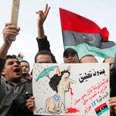
Protesters in Libya
צילום:רויטרס
The Gaddafi disgrace
Op-ed: World stood silent for years as Libya’s brutal dictator played key role in global forums
Muammar Gaddafi has become the symbol of the hypocrisy of the world. Today the world is shocked by the activities of this brutal man, as he lashes out with force against his own people. In the midst of a bloody and violent week in Libya, in which hundreds of citizens have been killed, thousands injured and missing, in which the air force has bombed protesting civilians, and hospitals have been instructed not to treat the injured – the world has finally woken up to the true face of Muammar Gaddafi.
But who facilitated his continued leadership in Libya and his continued subversive terrorist activities for over 40 years? But who nominated Gaddafi's Libya to a range of key roles in the United Nations and other international forums?
The longest serving leader in the Arab world, Gaddafi followed Abdel Nasser's ideas of pan-Arabism and became a fervent advocate of the unity of all Arab states into one Arab nation. He also supported pan-Islamism, the notion of a loose union of all Islamic countries and peoples, and saw himself as the liberator of several African countries. After Nasser's death on September 28, 1970, Gaddafi attempted to take up the mantle of ideological leader of Arab nationalism. He proclaimed the "Federation of Arab Republics" (Libya, Egypt and Syria) in 1972, hoping to create a pan-Arab state, but the three countries disagreed on the specific terms of the merger.
Notable in Gaddafi's politics has been his sponsorship of rebel movements in West Africa, notably Sierra Leone and Liberia, through the support of terrorist activities. Gaddafi supported a number of terrorist organizations in the 1970s and 1980s operating throughout the world, as well as revolutionary Iran. Gaddafi was a major financier of the Black September Movement which perpetrated the Munich massacre at the 1972 Summer Olympics, and was accused by the United States of being responsible for direct control of the 1986 Berlin discotheque bombing that killed three people and wounded more than 200, of whom a substantial number were US servicemen. By the mid-1980s, he was widely regarded as the principal financier of international terrorism.
Gaddafi's Libya was the force behind the horrid 1988 Lockerbie bombing, which resulted in hundreds of casualties. Gaddafi also led the appeal that secured the release of arch-terrorist Abdelbaset al-Megrahi, through appeals regarding his deteriorating health – although he was provided a hero's welcome upon returning to Libya.
Have we no shame?
Despite all of these subversive activities against Western targets, the international community somehow accepted Libya in various influential forums, and forgave Gaddafi for past transgressions, somehow believing that a "new" Gaddafi had appeared on the scene from the 1990s onward.
How is it that Gaddafi's Libya, a country that showed absolutely no respect for human rights, was elected to chair the United Nations Human Rights Commission in 2003 and was again elected to serve on the commission in 2010? Is there anything more absurd than a constant abuser of human rights being nominated to protect human rights in such a leading international forum?
In 2008, Libya was elected to perhaps the most important and exclusive forum at the United Nations – the UN Security Council – and served as its president twice. Libya exploited this position by taking an essential role in advancing its distorted version of human rights in the UN by calling for an emergency discussion of the infamous Goldstone Report.
Today, the world is abhorred by Gaddafi's actions against his own people. However, for years the world stood silent as a serial human rights abuser and a terrorist-supporting regime - in fact, the ultimate "rogue state" - took a leading role in international forums, becoming a type of "reformed darling" of the West. Have we no shame?
Dr. David Altman is Senior Vice President of Netanya Academic College and Vice-Chair of the S. Daniel Abraham Center for Strategic Dialogue. Elie Friedman is Project Manager at the S. Daniel Abraham Center for Strategic Dialogue
- Follow Ynetnews on Facebook










